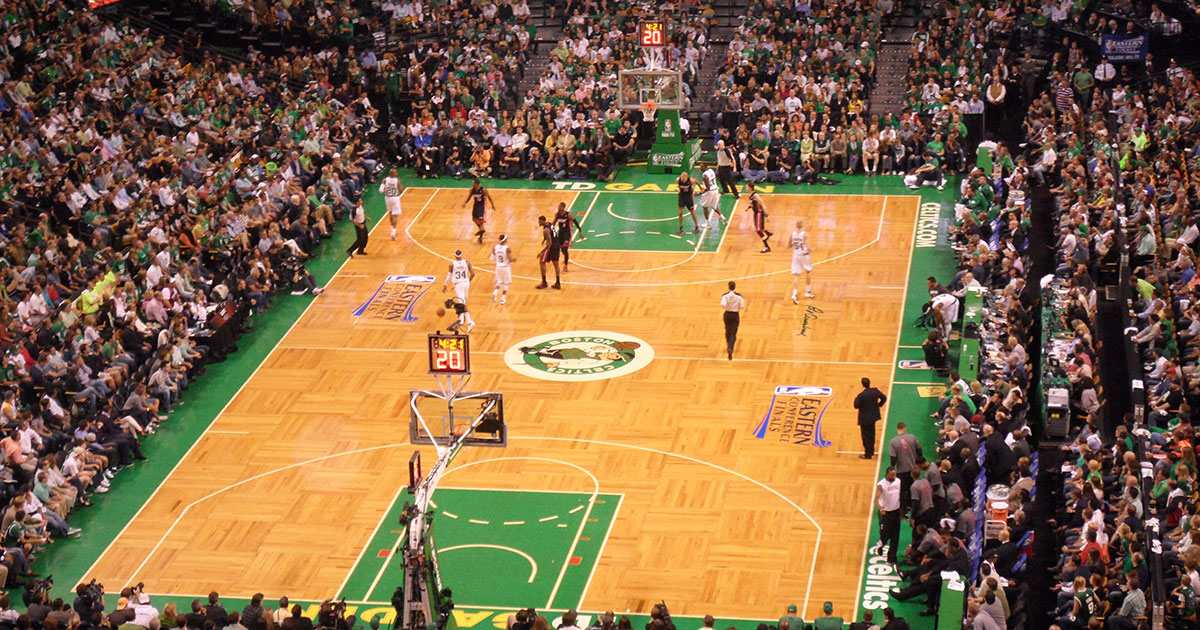Big Bucks for the Boston Celtics: What a Record-Breaking Sale Means for the Brand and Its Fans

What kind of price tag do you put on a legacy?
The Boston Celtics, one of the premier franchises in the NBA, has a long history of achievement. That history includes 18 titles, legendary players, a fabled parquet floor, and a loyal and large fan base.
How much is all that history and achievement worth? Turns out $6.1 billion.
That’s the amount that an investment group, led by Bill Chisholm, has agreed to pay the Grousbeck family, the Celtics’ current owner. The sale, which was announced in March and is pending approval by the NBA Board of Governors, represents a record for a North American sports team.
“When it came out, I was surprised by the valuation,” says Anjali Bal, associate professor of marketing, who teaches courses in Babson’s sports management concentration and conducts research on topics related to entertainment and sports marketing. “This was a blockbuster deal for them.”
With a Celtics playoff run for a 19th title currently underway, Bal looks at the team’s sale and what it says about the strength of the Celtics brand, as well as whether the selling of sports franchises for such increasingly exorbitant sums is ultimately a good or bad turn of events for those teams’ loyal fans. On that last question, Bal remains unsure. “I’ve debated that a lot,” she says.
A Strong Brand
Owning a sports team has never been an inexpensive proposition. “It’s never been everyday people who owned the team,” Bal says.
In recent years, though, the price of ownership has been increasingly going up. In 2020, MLB’s New York Mets sold for $2.4 billion. Over the next few years, the NBA’s Milwaukee Bucks ($3.5 billion), the NBA’s Phoenix Suns ($4 billion), the NFL’s Denver Broncos ($4.65 billion), and the NFL’s Washington Commanders ($6.05 billion) went for steadily more dizzying prices.

In large part, the market is responding to wealthy individuals more and more wanting the prestige of owning a sports team. “Demand goes up, prices go up,” Bal says. Private equity money also is flooding into pro sports, and increasing international interest in North American teams is pushing up their valuations.
Despite all that, the high Celtics valuation surprised Bal. A lot of sports organizations own the venues where they play, and that real estate can greatly add to a team’s price tag. The Celtics, however, are only tenants at their home arena, which is owned by the parent company of the NHL’s Boston Bruins. “TD Garden is amazing, but they don’t own it,” Bal says. “This evaluation was effectively betting on the value of the brand.”
The brand’s high value reflects the decades of consistent success that has made the Celtics one of the league’s two premier franchises, along with the Los Angeles Lakers. Coming across multiple eras of the NBA, that success has not been dependent on any single player. As one star player has retired, others have risen to take his place.
By contrast, the question of star power is something that hangs over the value of the Golden State Warriors. That team is considered the most valuable in the NBA, but with Steph Curry, its franchise-defining star, now 37, Bal wonders what will become of the team’s value once he retires. “Golden State might be first, but a lot of that is related to Steph Curry,” Bal says. “I think they will still have support (when Curry retires), but I will be interested if they can maintain their number one evaluation.”
Another factor powering the Celtics’ brand is the intensity of its rivalries, not just with the Lakers (the franchises have met a dozen times in the NBA finals), but with a smattering of other teams across the league. “Everybody wants to beat the Celtics,” says Bal, who explains that, as often happens in sports, the more dislike that a team receives, the more loyal its fans become to its brand.
What About the Fans?
The sale of the Celtics and other sports teams for such sky-high sums does raise one critical question: What do owners expect from their investment, and what will that mean for fans? “If I invest $100 million vs. $6 billion, the return I expect to get on that is very different,” Bal says.
To recoup some of their investment, team owners could seek to squeeze more money out of their TV contracts. Consider the NFL, which in recent years has been moving more games from free broadcast TV to pay sites such as Netflix and Amazon Prime Video. NFL fans must spend well over $1,000 if they want to watch all the games, a price that many seem willing to pay, at least for now. “You will hit a number where they can’t pay it,” Bal says.
“When it came out, I was surprised by the valuation. This was a blockbuster deal for them.”
Anjali Bal, associate professor of marketing
Owners also could decide to significantly raise ticket prices. That’s a feasible move for a popular team like the Celtics, which has a high demand for tickets. The future of a team’s fandom, though, is built on young people, and a night out at a Celtics game is already an expensive proposition for a working family. What are the implications for the long-term health of a team if children can’t see games in person because it’s too expensive?
“We need the next generation of consumers to have access to a sport or else they won’t be able to maintain its popularity,” Bal says. “It isn’t just wealthy people who support the team in the long run. It is all fans. Access is important.”
Posted in Insights






